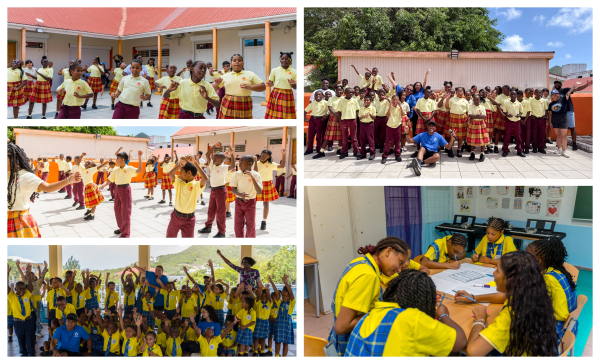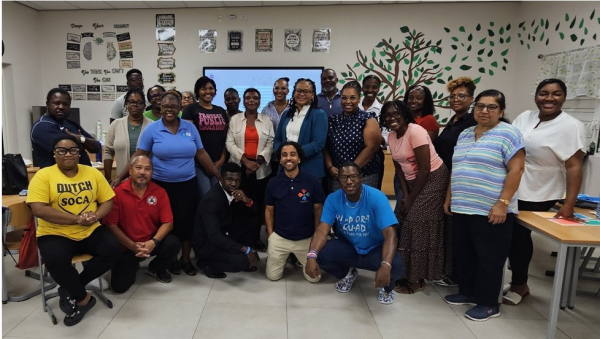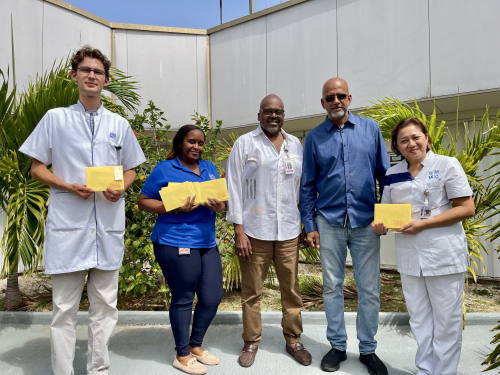 PHILIPSBURG:--- The local RISE Foundation and the US-based The Nick Singh Foundation joined to bring project-based learning and arts-based sessions, including dance and movement, to more than 225 children across Sint Maarten. The collaboration, which began earlier this year, focused on pooling resources and skills to serve the island’s youth better.
PHILIPSBURG:--- The local RISE Foundation and the US-based The Nick Singh Foundation joined to bring project-based learning and arts-based sessions, including dance and movement, to more than 225 children across Sint Maarten. The collaboration, which began earlier this year, focused on pooling resources and skills to serve the island’s youth better.
To start the school year on a positive note, the sessions were offered free of charge to four institutions: ACE Foundation, Oranje School, Leonald Connor School, and 721 Kids Foundation. Together, over 225 children benefited from a fun and engaging start to the academic year.
Students participated in a range of activities designed to inspire both critical thinking and creative expression. Brandon Street and Lilly Barkes of Listen to Our Future led a dynamic project-based learning session where students identified issues affecting their communities, from racism and bullying to sexual assault and community violence, and worked together to brainstorm and present solutions. Meanwhile, Tiffany Castillo of TM Talent NY facilitated a high-energy dance and movement program infused with positive affirmations and teamwork. The session left children filled with joy, laughter, while also strengthening their focus, coordination, and confidence.
Students were also treated to refreshments thanks to community support. Carl & Sons baked and donated more than 200 raisin buns, while Kam’s Trading provided juices, thoughtful touches that made the sessions feel extra celebratory. In addition, The Nick Singh Foundation brought supplies from the United States, which were used to create 10 teacher resource boxes. These were distributed across the four organizations to support Cycle 1 classrooms, providing extra materials to strengthen day-to-day teaching and learning.
The success of the initiative was also made possible through strong local partnerships. Paradise Inn generously provided accommodation for the visiting volunteers, while Motorworld supported transportation needs with a donated vehicle. Pollos Hermanos treated the volunteers and RISE team to a well-earned meal during one of the full activity days. And Dr. Soc and Island 92 not only amplified the back-to-school drive on their media platform, but also offered behind-the-scenes encouragement and intangible support that helped make the project a success.
“This collaboration showcases the boundless opportunities that exist when NGOs unite with the same heart for youth and community. We look forward to building on this momentum and continuing to expand our impact together,” said the RISE Foundation team.
Nick Singh, Founder of The Nick Singh Foundation, added:
“We are deeply grateful to the RISE Foundation for inviting us to be part of such a meaningful initiative, and to our generous sponsors—Pollos Hermanos, Paradise Inn, Motorworld, and all the donors—who made this possible. Seeing the children light up with joy as they received their school supplies, danced with passion, and engaged in activities that encouraged positivity and critical thinking was truly unforgettable. These supplies ensure that students can enter the classroom without the burden of lacking resources, empowered to learn and thrive throughout the year. None of this would have been possible without our incredible volunteers—Brandon, Emily, Lilly, Tiffany, and Anthony—whose dedication brought the vision to life. At The Nick Singh Foundation, we believe in the power of collaboration, and this project was a beautiful reminder that when communities, organizations, and individuals unite, we can create lasting change and bring joy where it’s needed most.”
Chiaira Bowers, President of the RISE Foundation, added:
“This was an opportunity for everyone to learn from each other and experience true camaraderie. Hearing the voices of our youth — their concerns, their ideas, their solutions — gives us fuel for future projects and opportunities to keep improving our island. And seeing the pure energy and excitement from the kids reminded us why this work matters so much.”
As we close this drive, we now head into our year-long Elevate Youth and Family Program, the Fostering Elevation Program, and other youth-led and holiday projects in the coming months.
For more information and upcoming projects, follow RISE Foundation on Facebook at facebook.com/risesxm, call +1-721-584-7473, or email This email address is being protected from spambots. You need JavaScript enabled to view it..
 PHILIPSBURG--- In a major step toward modernizing vocational and technical education, the Ministry of Education, Culture, Youth and Sport (MECYS), through the Division of Educational Innovation (DEI), partnered with UNESCO to organize an intensive STEAM training for educators at the Sint Maarten Vocational Training School (SMVTS). The three-day workshop held during August 20-22, 2025, introduced teachers to innovative, transdisciplinary teaching methods designed to prepare students for the workforce of tomorrow.
PHILIPSBURG--- In a major step toward modernizing vocational and technical education, the Ministry of Education, Culture, Youth and Sport (MECYS), through the Division of Educational Innovation (DEI), partnered with UNESCO to organize an intensive STEAM training for educators at the Sint Maarten Vocational Training School (SMVTS). The three-day workshop held during August 20-22, 2025, introduced teachers to innovative, transdisciplinary teaching methods designed to prepare students for the workforce of tomorrow. PHILIPSBURG:--- As a precursor to one of our grand upcoming events, our Club will be highlighting outstanding members through monthly spotlights. This initiative serves both to celebrate our members’ achievements and to inspire others in our community by showcasing the impact of Toastmasters leadership and growth.
PHILIPSBURG:--- As a precursor to one of our grand upcoming events, our Club will be highlighting outstanding members through monthly spotlights. This initiative serves both to celebrate our members’ achievements and to inspire others in our community by showcasing the impact of Toastmasters leadership and growth. CAY HILL:--- Local Department Store COLORS recently made a generous and heartfelt donation to patients of the Obstetrics and Gynecology (OBGYN) Ward of St. Maarten Medical Center (SMMC). The store has provided gift vouchers that will be distributed to mothers upon discharge, offering them and their newborns an opportunity to receive gifts for their newborn babies. This initiative holds special significance for the Colors family as both of their sons were born at SMMC.
CAY HILL:--- Local Department Store COLORS recently made a generous and heartfelt donation to patients of the Obstetrics and Gynecology (OBGYN) Ward of St. Maarten Medical Center (SMMC). The store has provided gift vouchers that will be distributed to mothers upon discharge, offering them and their newborns an opportunity to receive gifts for their newborn babies. This initiative holds special significance for the Colors family as both of their sons were born at SMMC. PHILIPSBURG:--- The RISE Foundation has wrapped up its 2025 Back-to-School Drive under the theme “It Starts With Us”, surpassing its original goal of 50 students by equipping 60 children with school packages and providing 10 resource boxes to teachers across four institutions.
PHILIPSBURG:--- The RISE Foundation has wrapped up its 2025 Back-to-School Drive under the theme “It Starts With Us”, surpassing its original goal of 50 students by equipping 60 children with school packages and providing 10 resource boxes to teachers across four institutions.